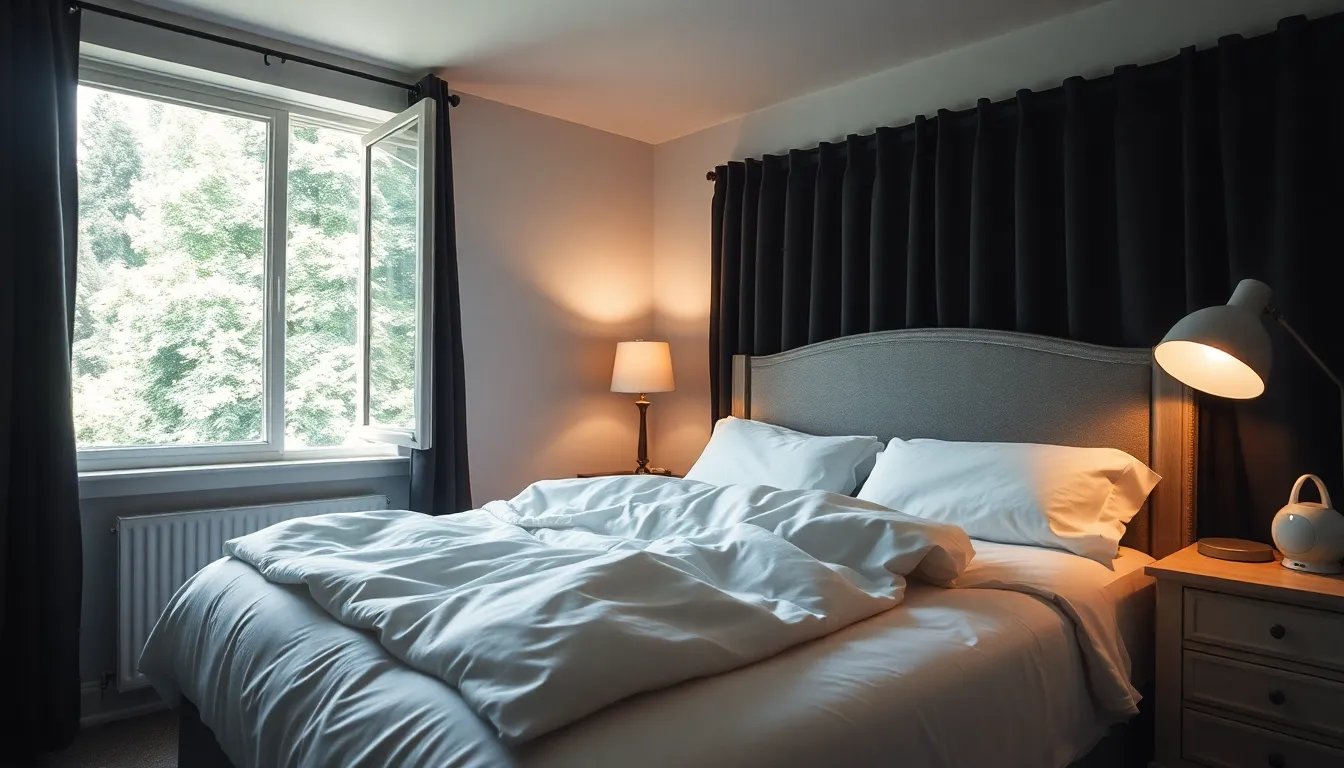In a world that never seems to hit the pause button, getting a good night’s sleep can feel like chasing a unicorn. Yet, sleep is more than just a luxury; it’s a necessity for a thriving mind and body. Without it, mornings can turn into a caffeine-fueled struggle, and that afternoon slump? It’s practically a rite of passage.
But fear not! With a few clever tweaks to their nightly routine, anyone can transform their sleep game from restless tossing to peaceful slumber. From setting the perfect sleep environment to mastering the art of relaxation, these sleep tips will have them snoozing like a pro in no time. So grab a cozy blanket and prepare to dive into the secrets of sweet dreams—because who wouldn’t want to wake up feeling like a well-rested superhero?
Table of Contents
ToggleUnderstanding Sleep Quality
Quality sleep plays a crucial role in maintaining overall health. It contributes significantly to mental clarity and physical vitality.
Importance of Sleep
Sleep supports cognitive functions, emotional stability, and immune system efficiency. Adequate sleep minimizes the risk of chronic health issues such as obesity and cardiovascular disease. Research indicates that adults typically require 7 to 9 hours of sleep to function optimally. During deep sleep, the body repairs muscles and consolidates memories, underscoring sleep’s restorative properties. When individuals prioritize sleep, they often notice improvements in mood, focus, and decision-making abilities.
Common Sleep Disorders
Sleep disorders disrupt healthy sleep patterns, impacting daily life. Insomnia affects about 30% of adults, leading to difficulty in falling or staying asleep. Sleep apnea results in breathing interruptions during sleep, posing serious health risks. Restless legs syndrome causes uncomfortable sensations and urges to move the legs, significantly hindering rest. Narcolepsy triggers sudden sleep attacks, negatively affecting daily activities. Understanding these disorders aids in recognizing the importance of proper sleep management and seeking necessary treatments.
Essential Sleep Tips


Improving sleep quality involves practical steps to promote restful nights. Employing effective strategies can lead to better mental and physical well-being.
Establishing a Sleep Schedule
Creating a consistent sleep schedule helps regulate the body’s internal clock. Adults benefit from aiming for 7 to 9 hours of sleep per night. Setting a regular bedtime and wake time enhances sleep quality. Adjusting the schedule gradually, no more than 15 minutes at a time, allows the body to adapt. Sticking to this routine on weekends maintains this positive momentum. Remember, habits form best with consistency and dedication.
Creating a Sleep-Inducing Environment
A sleep-inducing environment plays a vital role in achieving deep, restorative sleep. Maintaining a cool room temperature between 60°F and 67°F optimizes comfort. Dark curtains or blackout shades eliminate disruptive light. Incorporating white noise machines or fans neutralizes background sounds. Comfortable bedding and supportive pillows enhance overall relaxation. Lastly, removing electronic devices reduces distractions and promotes a serene atmosphere. Prioritizing these factors contributes significantly to improved sleep quality.
Lifestyle Changes for Better Sleep
Making lifestyle changes significantly enhances sleep quality. Simple adjustments can create a positive impact on nightly rest.
Reducing Screen Time
Limiting screen time, especially before bedtime, fosters better sleep. Blue light from devices interferes with melatonin production, making it harder to fall asleep. Ideally, turning off electronic devices at least one hour before sleeping helps the body wind down. Engaging in activities like reading a book or listening to music offers healthier alternatives. Establishing a tech-free zone in the bedroom further encourages relaxation and signals the mind that it’s time to rest.
Incorporating Relaxation Techniques
Integrating relaxation techniques into a nightly routine aids in achieving restful sleep. Mindfulness meditation, for instance, calms the racing thoughts that often disrupt sleep. Practicing deep breathing exercises before bed can lower stress levels and promote relaxation. Stretching or gentle yoga also prepares the body for sleep by relieving muscle tension. Prioritizing these activities increases the likelihood of drifting into deep sleep, enhancing overall well-being.
Dietary Considerations for Sleep
Diet significantly influences sleep quality. Certain foods can help promote better rest.
Foods to Promote Better Sleep
Foods rich in magnesium, such as leafy greens, nuts, and seeds, aid in muscle relaxation and can enhance sleep quality. Complex carbohydrates like whole grains encourage the production of serotonin, which helps regulate sleep. Tart cherries and kiwi contain melatonin, directly impacting sleep patterns. Incorporating these foods into evening meals or snacks can be beneficial. Avoiding large meals close to bedtime is recommended, as it can lead to discomfort and disrupt sleep.
Caffeine and Alcohol Effects
Caffeine consumption, particularly in the afternoon, can delay sleep onset and reduce overall sleep duration. Individuals sensitive to caffeine might find that even small amounts interfere with their ability to fall asleep. Alcohol, on the other hand, may initially induce drowsiness but often disrupts sleep later in the night, leading to fragmented rest. Limit both substances to improve sleep consistency. Making informed choices about food and drink before bedtime plays a crucial role in achieving restful nights.
Improving sleep quality is essential for overall health and well-being. By making small adjustments to nightly routines and environments, individuals can experience more restful nights and wake up feeling refreshed. Establishing a consistent sleep schedule and creating a calming atmosphere are crucial steps toward better sleep.
Incorporating relaxation techniques and being mindful of dietary choices can further enhance sleep quality. It’s important to recognize the impact of lifestyle habits on sleep patterns. With dedication and the right strategies, anyone can achieve the restorative sleep they need to thrive each day. Prioritizing sleep is not just a luxury; it’s a necessity for a healthier and happier life.









